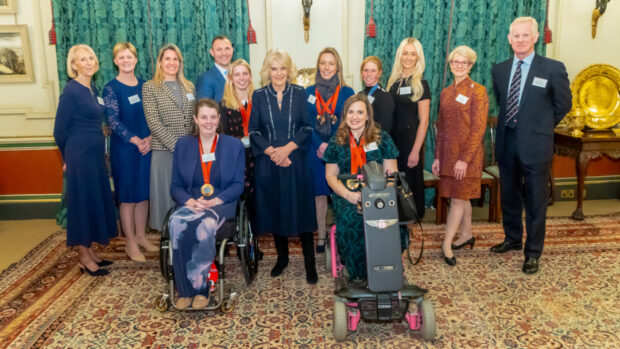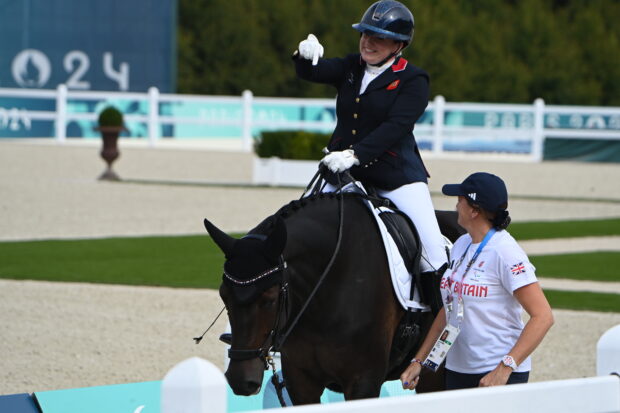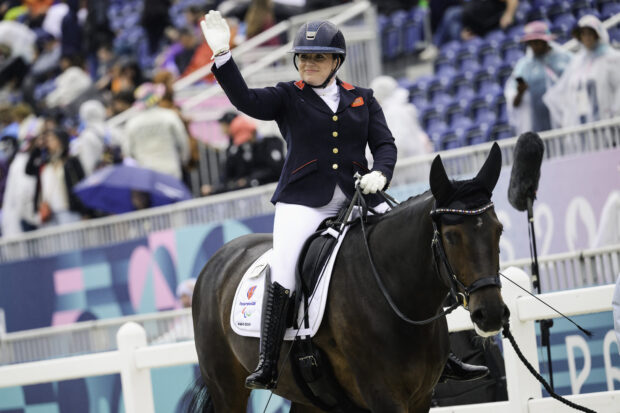Britain has missed out on a Paralympic dressage team medal for the first time in the sport’s history, finishing in sixth on a team score of 219.562.
After winning their first-ever team medal in Tokyo, the USA put in a series of sensational performances to win gold with a record-breaking score of 235.567. Despite improving on their Tokyo team score, the Dutch team had to settle for silver on 223.751 while Germany took bronze on 223.751.
The well-backed Dutch team got off to a flying start in the grade IV. First, team veteran Sanne Voets and the decorated Demantur managed to improve on their score from the individual test to earn 76.57%. Then Demi Haerkens and Duala added to the team total, with a score of 78.22%.
Roxanne Trunnell was first to go for the USA in the grade I, achieving 77%. However, the real difference makers were Fiona Howard and Diamond Dunes in grade II, who scored a massive personal best of 80% – the highest score of the competition so far.
“From the first halt to the last halt it was all highlights,” Fiona said. “What a feeling when you can just trust your horse, and he just kept giving and giving. At the end my muscles were getting really tired, and I said ‘Keep going buddy’, and he was like ‘I got you’ – he’s incredible.”

Rebecca Hart and Floratina score a personal best to ensure a first-ever team gold medal for the USA at the Paris Paralympics. Credit: Kevin Sparrow
Rixt van der Horst and Royal Fonq were next up for the Dutch and scored another massive score of 78.07% in the grade III. Last-to-go for the USA, Rebecca Hart and Floratina, entered the arena immediately after Rixt and had to score a personal best of plus 76% to win gold.
A tall order, but as soon as the combination got under way, it was never in doubt – their test was close to faultless, scoring 78.57%
“This one I dug deep for,” beamed Rebecca. “It’s always a bit intense being the closer for the team and knowing what your score needs to be in a pressure cooker situation.
“I was doing the math, and I managed to peak a look at the board for Rixt’s score and thought, ‘OK, lets go, game on!’
“I’m so proud of these girls and everyone behind the scenes, it wouldn’t have happened without each and everyone of us putting our best foot forward – it’s like a fairytale. This win will give us such a huge boost, so many times para sport isn’t highlighted as much as able-bodied sport.
“What I’m really, really hoping that this success and these medals bring for para is the recognition and the equality of the multiple disciplines within our federations, and realising we are valuable and we can deliver when we need to.”
No medals for Britain, but optimism for the future
Sophie Wells and the inexperienced LJT Egebjerggards Samoa (“Diana”) were first to go for the British team. Sophie thinks this mare will be “the best horse in the world at some point”, and they had moments of real quality in their test, with the shoulder-ins a particular highlight.
However, a break in the first extended trot and an expensive mistake in the first simple change after the half-pass to the centre line kept their score at 70.89%.
“I’m kicking myself if I’m absolutely frank,” said Sophie, who looked devastated but had to put on a brave face when she was waylaid on her way to the mixed zone after her test by Prince Edward, who’s a patron of the British Paralympic Association.
“She felt so good going in but I relaxed for a second in the extended trot, and then for the simple change, I just didn’t feel it coming. She surged out into the half-pass and I was like ‘Just be patient, get her back’.
“I got it back in the walk but then I clearly got my timing wrong, and you know she might be eight but I can still ride a simple change, and it’s a double coefficient which was really, really rubbish.
“I know I’ve got to keep her confidence, so once I tried to strike back off and didn’t get it, I just decided to stop asking.
“But it feels like time goes so quick in there, you take a breath for a second and it feels like 20 seconds – it’s hard having a mistake like that in front of everyone.
“We got it back, so I’m positive for tomorrow, but I feel like I haven’t quite done my part for the team and I feel bad for the guys coming after me because they’ve got a lot of work to do.
“The sport has come on so much it’s amazing. Other teams have overtaken us and that’s what sport should be, it shouldn’t be predictable. We’ve got to go home now, work hard and come back fighting.”

Georgia Wilson and Sakura during the grade II team test at the Paris Paralympics. Credit: Kevin Sparrow
Georgia Wilson and Sakura (“Suki”), who were competing in their first team event at the Paralympics were the next British combination to go and scored 73.3%.
“I was pleased with Suki,” Georgia said. “She tripped over a few times at the start but we got there in the end, and produced some nice work. I was probably pushing a bit too much in the beginning, and I was a bit nervous so she probably picked that up.”
At that point, Britain were sitting behind Germany, France, Belgium and Italy, among the other teams who had one rider left to go.
Next to go for the Germans, Heidemarie Dresing – who, at 69, was the oldest competitor in the field – and Dooloop put in a solid test to score 72.9%.
That meant Natasha Baker, who was first to go in the grade III on Dawn Chorus, knew that to overhaul the German score and guarantee a medal for the team she needed an odds-defying 79.56%.
In the end, despite a free-flowing test and a personal best score since her return to competition six months ago, her 75.37% wasn’t enough to catch the Germans, but it was enough to close the margin on the teams ahead.
France and Italy’s grade III riders did enough to retake the lead over Britain, but that didn’t dampen Natasha’s spirits.

A delighted and proud Natasha Baker with Dawn Chorus after her grade III team test. Credit: Kevin Sparrow
“I was thrilled with her, she just went in there and grew in confidence,” explained Natasha. “Her balance was much better and she stayed really relaxed – I just can’t wait for tomorrow now, I’m so excited.
“My aim coming here was to build each day, I wanted to give her a safe clear round in the first day and build on it as the days go on, and I feel I’ve done that today. I think tomorrow I can go in there and go for it.
“I’m so proud of my performance, but I’m also so proud of Sophie and Georgia. They both rode beautifully, and all you can do is come to a Games and ride your best and that’s exactly what the girls have done.
“Sophie rode an absolute masterclass this morning and gave Diana an amazing experience. We’ve also got to remember that’s her reserve horse, and it’s her first big Games in that type of atmosphere.
“I’m also on my comeback, Sophie’s on a new horse, Georgia’s the experienced one of us out here and she was an individual in Tokyo, so I think we should all be incredibly proud of ourselves.
“We knew we might not bring home a medal in the team, but it’s fine, we’ll live to tell another tale tomorrow and hopefully we can come back with some more medals.”
- To stay up to date with all the breaking news throughout the Paralympic Games, Burghley, Horse of the Year Show and more, subscribe to the Horse & Hound website
You might also be interested in:

How to watch the 2024 Paralympics dressage live from around the world

‘She was so brave’: Sophie Wells guides rising star to an unexpected medal in Paris

Natasha Baker and Dawn Chorus mark emotional championship comeback with Paralympic medal

‘I’m over the moon’: Georgia Wilson and Sakura secure back-to-back medals for Britain at the Paris Paralympics

Subscribe to Horse & Hound magazine today – and enjoy unlimited website access all year round




